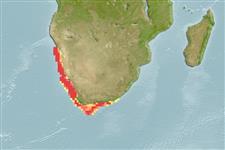>
Ophidiiformes (Cusk eels) >
Ophidiidae (Cusk-eels) > Ophidiinae
Etymology: Genypterus: Greek, geny, -yos = face, jaw + Greek, pteron, = wing, fin (Ref. 45335).
Environment: milieu / climate zone / depth range / distribution range
Ecologia
marinhas batidemersal; intervalo de profundidade 50 - 500 m (Ref. 4103), usually 250 - 350 m (Ref. 27121). Deep-water; 21°S - 37°S, 12°E - 28°E (Ref. 34024)
Eastern Atlantic: Walvis Bay, Namibia to Algoa Bay, South Africa. Distinctiveness of this species and Genypterus blacodes is unclear (Ref. 34024).
Length at first maturity / Tamanho / Peso / Idade
Maturity: Lm 67.5, range 60 - 75 cm
Max length : 180 cm TL macho/indeterminado; (Ref. 3686); peso máx. Publicado: 15.0 kg (Ref. 9988)
Descrição breve
Chaves de identificação | Morfologia | Morfometria
Raios dorsais moles (total) : 150; Raios anais moles: 110. Head and body usually pinkish to orangish with dark spots and blotches especially dorsally (Ref. 34024).
Occur in rocky areas of the shelf and upper continental slope. Juveniles found in shallow waters than adults (Ref. 36731). Benthic and common species (Ref. 34024). Feed on dragonets, mantis shrimps, hake, squid, and various fishes (Ref. 27121). Spawning occurs from August to October. Oviparous, with oval pelagic eggs floating in a gelatinous mass (Ref. 205). Utilized fresh and frozen; can be fried and baked (Ref. 9988).
Life cycle and mating behavior
Maturidade | Reprodução | Desova | Ovos | Fecundidade | Larvas
Nielsen, J.G., D.M. Cohen, D.F. Markle and C.R. Robins, 1999. Ophidiiform fishes of the world (Order Ophidiiformes). An annotated and illustrated catalogue of pearlfishes, cusk-eels, brotulas and other ophidiiform fishes known to date. FAO Fish. Synop. 125(18):178p. Rome: FAO. (Ref. 34024)
Categoria na Lista Vermelha da IUCN (Ref. 130435: Version 2024-1)
Ameaça para o homem
Harmless
Utilização humana
Pescarias: espécies comerciais
Ferramentas
Relatórios especiais
Descarregue XML
Fontes da internet
Estimates based on models
Preferred temperature (Ref.
123201): 9 - 15.5, mean 9.5 °C (based on 14 cells).
Phylogenetic diversity index (Ref.
82804): PD
50 = 0.5156 [Uniqueness, from 0.5 = low to 2.0 = high].
Bayesian length-weight: a=0.00224 (0.00115 - 0.00435), b=3.16 (2.99 - 3.33), in cm total length, based on LWR estimates for this species & (Sub)family-body (Ref.
93245).
Nível Trófico (Ref.
69278): 4.4 ±0.61 se; based on food items.
Resiliência (Ref.
120179): Baixo, tempo mínimo de duplicação da população 4,5 - 14 anos (K=0.06-0.14; tm=4-5).
Prior r = 0.17, 95% CL = 0.11 - 0.26, Based on 1 full stock assessment.
Fishing Vulnerability (Ref.
59153): High to very high vulnerability (73 of 100).
Climate Vulnerability (Ref.
125649): High vulnerability (64 of 100).
Nutrients (Ref.
124155): Calcium = 12.1 [7.6, 26.2] mg/100g; Iron = 0.354 [0.185, 0.683] mg/100g; Protein = 15.6 [13.7, 17.7] %; Omega3 = 0.242 [0.131, 0.475] g/100g; Selenium = 26.1 [11.8, 57.4] μg/100g; VitaminA = 8.8 [1.9, 40.5] μg/100g; Zinc = 0.247 [0.165, 0.370] mg/100g (wet weight);
